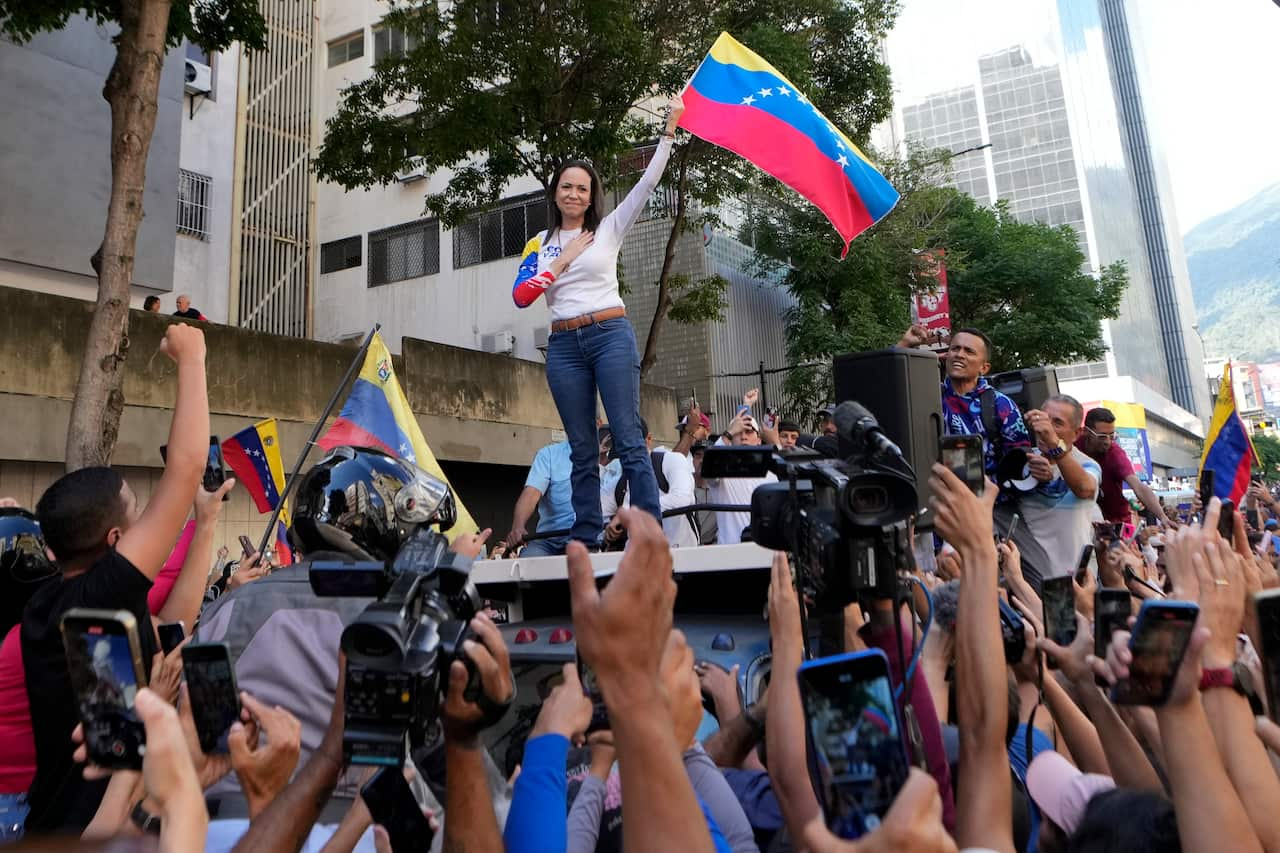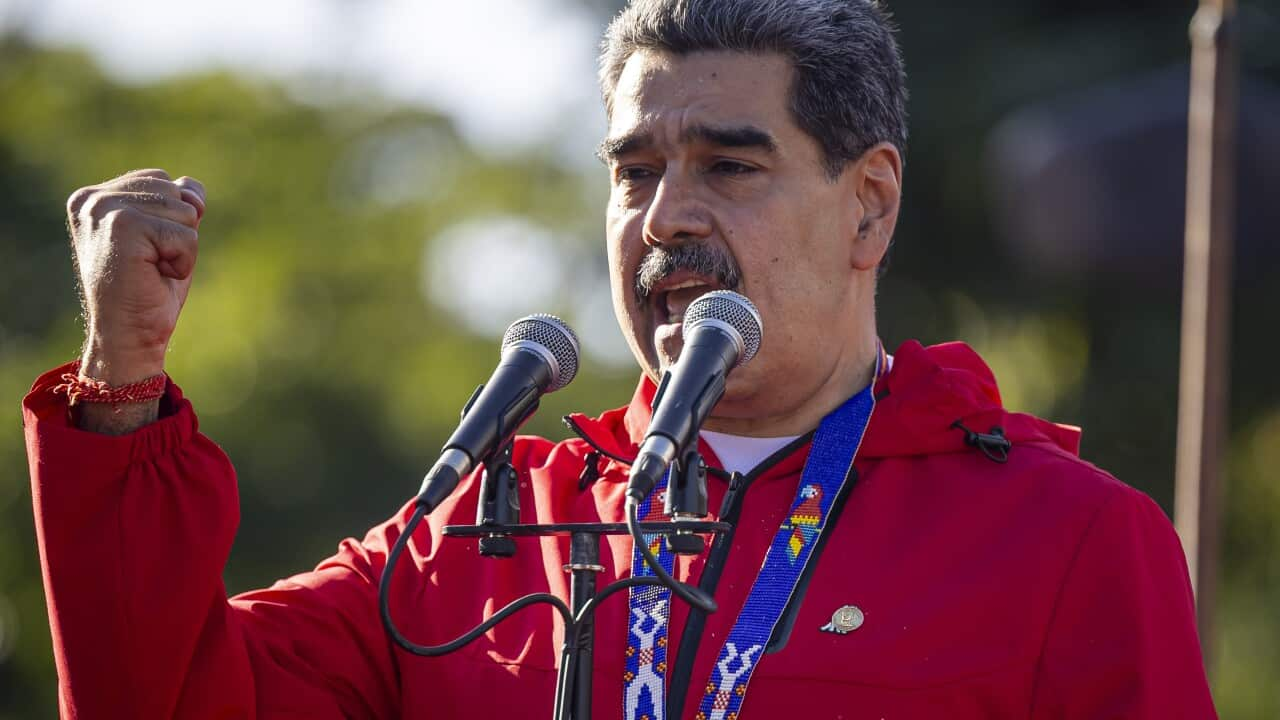Venezuela's government has announced it will be closing its embassies in Australia and Norway in a restructuring of its foreign service, as tensions escalate between the South American country and the United States.
The closures are part of the "strategic re-assignation of resources", President Nicolás Maduro's government said in a statement on Monday.
The Venezuelan government said consular services to Venezuelans in Norway and Australia will be provided by diplomatic missions, with details to be shared in the coming days.
Venezuela has also announced it will be opening new embassies in Burkina Faso and Zimbabwe, which it described as "two sister nations, strategic allies in the anti-colonial fight and in the resistance against hegemonic pressures".
Both countries have governments that are aligned with Russia, which recently expressed support for Venezuela at the United Nations while criticising the US.
Raul Sanchez-Urribarri, an associate professor from the School of Humanities and Social Sciences at La Trobe University, called Venezuela's decision to close its embassy in Australia a "strong disappointment" and said he is concerned about the lack of consular services for Venezuelans in Australia.
Sanchez-Urribarri said he was first made aware of the news that the embassy would be closing after a friend reached out to him asking how he would renew his passport.
"The Venezuelan population in Australia is not terribly big, but it's still significant," Sanchez-Urribarri said.
"It's calculated at about 10,000 to 15,000 Venezuelans who use those services, and Australia being so distant from other locations, then there is concern that by shutting down the consular services, it will be hard for Venezuelans to avail themselves of those services if they're moved to another location."
Luis Patino, the vice president of the Venezuelan Community of South Australia, told SBS News he was not surprised the Venezuelan government chose to close its embassy in Australia as it has been changing many aspects of its foreign policy in recent years.
However, Patino — who moved to Australia in 2019 as a refugee — said the change makes him concerned for Venezuelans living in Australia.
"As a country, they're leaving all your citizens without permits and passports and any kind of documents they need to do," he said.
Patino also said visa applications for Australian citizens who want to visit their families in Venezuela could be impacted.
Why is Venezuela closing its embassy in Australia?
Sanchez-Urribarri said he's "mystified" about Venezuela's decision to close its embassy in Australia.
He said it may be loosely related to Venezuelan opposition leader María Corina Machado winning the 2025 Nobel Peace Prize last week for her "tireless work promoting democratic rights for the people of Venezuela".
In 2023, Machado won a resounding victory in the opposition's primary election, and her rallies attracted large crowds, but a ban on holding public office prevented the democracy campaigner from running for president against Maduro in 2024, and she went into hiding.
Jørgen Watne Frydnes, chair of the Norwegian Nobel Committee, announced on Friday that Machado had been awarded the prize for "her struggle to achieve a just and peaceful transition from dictatorship to democracy".
Sanchez-Urribarri said the award was an "unforeseen" development but represents a "further dent" in the Maduro regime's legitimacy.

"It bolsters the legitimacy and the visibility for the claim for redemocratisation in Venezuela," he said.
Posting on X after her win, Machado dedicated the prize "to the suffering people of Venezuela and to [US] President [Donald] Trump for his decisive support of our cause!"
The Nobel Peace Prize recipient is decided by the Norwegian Nobel Committee each year.
It is independent of the Norwegian government, but the Scandinavian country said it received notice of the Venezuelan embassy closure and no reason for the decision.
A Norwegian foreign ministry spokesperson said Venezuela's decision was "regrettable".
"Despite the fact that we have different views on several issues, Norway wishes to keep the dialogue with Venezuela open and will work towards that," the spokesperson said.
Sanchez-Urribarri said he believes the Venezuelan government may have decided to "lump" the closure of the Australian embassy in with the closure of the Norwegian embassy to give the announcement more heft.
"Nothing has happened recently [between Australia and Venezuela] that I know of that would merit that kind of reaction. In the case of Norway, I think it's quite clear — without a doubt," he said.
"But in the case of Australia, my main hypothesis right now is that this was something that was announced for bombastic effect, but there isn't really a reason."
Australia's relationship with Venezuela
Sanchez-Urribarri said Australia doesn't have a "functional relationship" with Venezuela right now due to the decline of democracy and rise of authoritarianism under Maduro, who has been president since 2013.
In 2019, Australia was among several countries, including the US and the United Kingdom, along with the European Union, that recognised the former Venezuelan opposition leader Juan Guaidó as the legitimate president until free and fair elections were held.
The validity of Maduro's presidential election and win last year was rejected by the US, European governments and 10 Latin American countries, including those with left-wing governments with strong historical ties to Venezuela.
Many countries said the election was rigged and backed opposition candidate Edmundo González's claim that he had won, but González fled Venezuela and sought asylum in Spain last September after a warrant was issued for his arrest.
Escalating tensions with the US
Tensions between the US and Venezuela have been escalating in recent months as Maduro alleges Trump is attempting to drive him from power.
Trump has explicitly accused Maduro of leading drug cartels and called him one of the "largest narco-traffickers in the world", although he has played down accusations that he is seeking to oust the Venezuelan president.
In September, Trump delivered the 'Major's List' to Congress — a list of 23 countries the US government says are responsible for sourcing and transporting illegal drugs into the US.
Venezuela was listed as one of five countries the US said had "failed demonstrably to make substantial efforts" to stop the drug trade.
The US also recently doubled a bounty for Maduro's arrest to US$50 million ($75 million).
Carlos Eduardo Morreo, a lecturer at the University of Melbourne and Latin American studies researcher, told SBS News earlier this year that the US government is attempting to paint Venezuela as a "narcoterrorist" state.
However, Morreo said there is "no proof really that Maduro and the government is involved in the shipments or benefits from these shipments or that the state is involved in any of these things directly."
Military tensions have also increased between the US and Venezuela.
The US government has recently conducted fatal military strikes on alleged Venezuelan drug trafficking boats that some international experts say violate international law.
There has also been a significant US military build-up in the southern Caribbean, with at least seven US warships reported in the region, along with one nuclear-powered submarine and F-35 stealth fighter aircraft deployed to Puerto Rico, posing a growing threat to Maduro.
The president has called for citizens to train for a potential US attack, and the president has deployed 25,000 troops along Venezuela's coastline and its border with Colombia.
Sanchez-Urribarri said it is difficult to get a true sense of how Venezuelans are responding to these threats due to fear of speaking freely under the Maduro government, but he is seeing a "strong anticipation or anxiety" in social media comments about what will happen between Venezuela and the US.
"There are a wide range of attitudes about it — from people who think something will happen any time soon to others that are in more of a 'watch and see' situation."
SBS News has contacted the Department of Foreign Affairs and Trade for comment.
— With additional reporting by Reuters.
For the latest from SBS News, download our app and subscribe to our newsletter.

